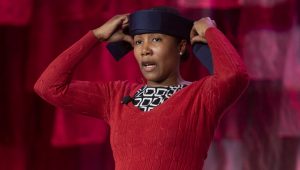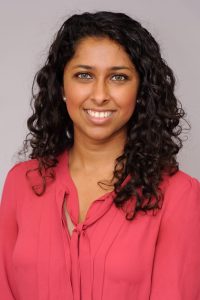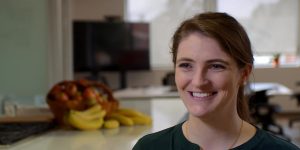MEET SOME OF THE USP’S WOMEN IN STEM ALUMNAE!

Audrey Ellerbee Bowden, G’07, with wearable brain-monitoring headband for children at SPIE Photonics West in 2020 (credit Joey Cobbs)
Audrey Ellerbee Bowden earned her PhD in Biomedical Engineering from Duke University in 2007. After graduation, she served as a Legislative Assistant in the United States Senate through the American Association for the Advancement of Science (AAAS) Science and Technology Policy Fellows Program. She then did postdoctoral training in Chemistry and Chemical Biology at Harvard University, after which she joined Stanford University as faculty in the Department of Electrical Engineering. In 2018, she moved to Vanderbilt University to join the departments of Biomedical Engineering and Electrical and Computer Engineering as the Dorothy J. Wingfield Phillips Chancellor’s Faculty Fellow. Her research interests include biomedical optics, microfluidics, and point of care diagnostics. She has developed several new designs that advance optical coherence tomography and has worked with clinicians to use these tools for the early detection of skin and bladder cancer. She also focuses on creating low cost point-of-care technologies for resource-limited applications in global health. Most recently, she has developed an inexpensive, portable headband to measure brain activity that can be used in addressing ADHD or other neurological disorders. Outside of her research, she is committed to addressing systemic racism in higher education, particularly in engineering, and to mentoring students from underrepresented backgrounds in STEM.

Carina Curto, G’06, Professor of Mathematics at Pennsylvania State University. (photo courtesy of Penn State Eberly College of Science)
Carina Curto completed her PhD in Mathematics at Duke in 2006 with a focus on algebraic geometry and string theory. She was a postdoctoral associate at the Center for Molecular and Behavioral Neuroscience at Rutgers University, which allowed her to apply her background in mathematics to neural network theory. After her postdoc, she served as an instructor at the Courant Institute at New York University before joining the faculty at the University of Nebraska Lincoln as Assistant Professor of Mathematics. She is now full professor at the Pennsylvania State University in the Department of Mathematics and a member of the Center for Neural Engineering & the Institute for Neuroscience and is the co-director of the Mathematical Neuroscience Lab at Penn State. In 2020, she received the Faculty Scholar Medal for Outstanding Achievement for her novel and interdisciplinary work at the intersection of mathematics and neuroscience. In 2021, she was named a Simons Fellow in Mathemetics by the Simons Foundation. The fellowship provides up to one year of academic leave for fellows to focus on research.

Katherine Dickinson, G’08, Assistant Professor of Environmental and Occupational Health. (Photo courtesy of UC Anschutz Colorado School of Public Health.)
Katherine Dickinson earned her PhD in Environmental Economics and Policy through the Nicholas School of the Environment at Duke in 2008. She did her postdoctoral training as a Robert Wood Johnson Health and Society scholar at the University of Wisconsin from 2008 to 2010, and at the National Center for Atmospheric Research (NCAR) from 2010 to 2013. She then spent four years as a Research Scientist/Project Scientist at NCAR with a joint appointment at the University of Colorado Boulder. In 2017, she joined the faculty as an assistant professor at the Colorado School of Public Health in the Department of Environmental and Occupational Health at the University of Colorado’s Anschutz Medical Campus. She is a member of the Consortium for Climate Change and Health, which addresses the impact of climate variability and change on current and future health issues by drawing on the expertise of team members with a wide range of disciplinary backgrounds. Her interdisciplinary research explores the impacts of policies and interventions on environmental, social, and health outcomes, with a particular focus on the role of social interactions and social networks in shaping risk perceptions and behaviors.

Kellyann Jones-Jamtgaard, Ph.D., T’07, biological sciences specialist at the USDA’s National Institute of Food and Agriculture in the Division of Community and Education.
Kellyann Jones-Jamtgaard graduated from Duke in 2007 with a B.S. in Biology and an A.B. in Spanish. She earned her PhD in Biology in 2016 from the University of Kansas, focusing on the cellular trafficking of Hepatitis C virus. The Kellyann Jones-Jamtgaard Student Diversity Award at the University of Kansas was named after her and recognizes students with an “exceptional passion for diversity and the capacity to develop leadership skills in this area.” After completing her PhD, she served as the career academies liaison at PREP-KC, a Kansas City-based education nonprofit from 2016-2020, where she designed and implemented STEM programming and built partnerships between KS and MO high schools, postsecondary partners, and industry. She also completed a fellowship in 2017 as a Christine Mirzayan Science and Technology Policy Fellow at the National Academies of Science, Engineering, and Medicine. She now serves as a biological sciences specialist at the USDA’s National Institute of Food and Agriculture in the Division of Community and Education. She provides support for minority-serving institutions programs, specifically Hispanic-serving Institutions and Alaska Native-serving and Native Hawaiian-serving Institutions grants programs. Her role allows her to combine her scientific interests in microbial pathogenesis and host-pathogen interactions with her interests in gender equity, health disparities, K-12 STEM education, and career development for basic science trainees and science policy.

Yi Li, M.D., T’06, Assistant Professor of Radiology, UCSF. (Photo courtesy of UCSF Fetal Treatment Center)
Yi Li graduated from Duke in 2006 with a B.S. in biology, an A.B. in Asian and African Languages and Literatures, and a minor in chemistry. She obtained her M.D. from Harvard Medical School. She initially planned to go into pediatrics but moved into radiology after working on a fetal and pediatric neurologic imaging project. After medical school, she completed a residency in diagnostic radiology at the University of California San Francisco and received the Margulis Society resident research award. She stayed at UCSF to do a fellowship in neuroradiology, during which she served as chief fellow during her clinical instructorship year. She received the Outstanding Fellow/Instructor Teaching Award in 2018 and then stayed on at UCSF as a faculty member in the neuroradiology section. She has won several awards for her research, including the Radiological Society of North America’s Research Scholar Award in 2019 to study newborn brain injury and the inaugural Rahul Desikan, MD Award for Outstanding Research, named for her mentor in neuroradiology. In 2020, she was named the Associate Fellowship Director for the neuroradiology fellowship. As a mother of a toddler, she still manages to teach fellows, work with patients, and conduct groundbreaking research. She credits strong women who have served as role models and mentors in neuroradiology, at all levels of training and seniority, and across all the sections, for career and motherhood advice, for support and encouragement, and for their mentorship, which she is eager to pay forward.

Professor Emily Moran, G’10, left, and graduate student Mengjun Shu examine seedlings in the research greenhouse (photo courtesy of Lorena Anderson, UC Merced).
Emily Moran received her PhD in Biology from Duke in 2010. She did a two-year postdoc at the National Institute for Mathematical and Biological Synthesis at the University of Tennessee and then a second postdoc at ETH Zürich’s Institute of Integrative Biology before heading to the University of California Merced to join the Department of Life and Environmental Sciences. Her research focuses on how ecological and evolutionary processes, and their interactions, may affect responses to environmental change in plants. She is interested in how seed dispersal, patterns of genetic diversity in plant species, and life history influence the vulnerability or resilience of given species to global climate change. She has published widely, most recently on the negative impacts of rising temperatures on tree seedlings in the Sierra Nevada mountains, an issue of deep concern in drought-stricken California. She does regular outreach in STEM: she communicates her research to lay but invested audiences such as conservation societies and conducts workshops with K-12 students interested in STEM, including creating a “Biology in a Box” program to stimulate interest and understanding of plant biology, from seed to byproducts such as lumber or paper.

Wanyi Ng, Pratt ’16, propulsion engineer at NASA Goddard Flight Center. (photo courtesy of Vertical Flight Society)
Wanyi Ng graduated from Duke in 2016 with a B.S.E. in Mechanical Engineering and a minor in Computer Science. As an undergrad at Duke, she conducted a summer internship in propulsion engineering on the Projectile Launcher Calibration Support team at NASA Goddard Space Flight Center. After graduation, she earned a Master of Science in Aerospace Engineering at the University of Maryland, where she was named one of “Tomorrow’s Engineering Leaders: The 20 Twenties” by Penton’s Aviation Week Network for her work on theoretical and experimental modeling of hybrid-electric rotorcraft propulsion. In graduate school, she served as a Propulsion Engineering Pathways Intern with the Goddard Space Flight Center at NASA and joined the team full-time in 2019 as a propulsion engineer. There, she has been working on propulsion subsystem design, integration, and testing, supporting the Europa Clipper, the interplanetary spacecraft scheduled to launch in 2030 to study Jupiter’s moon Europa and the James Webb and Nancy Grace Roman Space Telescope (RST) missions, scheduled to launch in December 2021 and in the mid-2020’s respectively.

Michaela Walker, Pratt ’16, Senior Manager at UPSIDE Foods (photo courtesy of NBC News Learn)
Michaela Walker graduated from Duke in 2016 with a B.S.E. in Biomedical Engineering. Her work as an undergraduate researcher in the Truskey Lab, Center for Biomolecular and Tissue Engineering led to a position after graduation as Research Scientist with Memphis Meats, now Upside Foods. She has been promoted multiple times and is now working as a second level scientist in tissue development. Upside Foods focuses on developing cell-cultured meats with the long-term goal of bringing such meats to market and reducing the environmental footprint of large-scale cattle farms. Scaled up, cell-cultured meat has the potential to dramatically reducing the impacts of global warming by shrinking air pollution by up to 93%, decreasing land use for cattle farming by up to 95%, and use 78% less water. Michaela was featured in an NBC News Learn story and is a cast member in the new documentary, “Meat the Future,” narrated by Jane Goodall.

Jessica Ward, DVM (photo courtesy of Christopher Gannon/Iowa State University)
Jessica Ward earned her B.S. Biology and Evolutionary Anthropology at Duke in 2007. After graduation, she received a Fulbright scholarship to study free-ranging lions in Botswana, comparing lion populations and reproductive trends among wild lions in southern and eastern Africa. Her findings helped contribute to trophy hunting policies in Botswana. After returning to the U.S., Jessica earned DVM at NC State University in 2011. She did a small animal internship at the Ohio State University and then returned to NC State to do her residency in cardiology. Switching her focus to small animal research allowed her to move into academia and train students. She joined Iowa State University College of Veterinary Medicine as Assistant Professor of Cardiology, where she has received the college’s Award for Early Achievement in Teaching, and is currently the assistant dean for extramural student programs. Her research explores ultrasound technology applications in veterinary cardiology, which allows for the diagnosis of congestive heart failure or other cardiovascular conditions, an approach which causes animals less distress than the traditional approach of x-ray technology.
 Dawn Woodard earned her PhD in Statistics at Duke in 2007. In 2008, she joined the School of Operations and Information Research at Cornell University as assistant professor of statistics, using her expertise in Bayesian statistics for applications in medicine to improve accuracy in interpreting mammograms; in environmental science to reveal local variability in groundwater contamination; and her work in statistics and machine learning to develop forecasting models for ridesharing pricing, vehicle fleet management in ride sharing services, and datacenter decision systems. After obtaining tenure at Cornell in 2014, Dr. Woodard was recruited by Uber in 2015, where she served as Senior Director, Applied Science and Data Science (Platforms + Uber for Business), leading various teams in the development of experimentation, geospatial, and machine learning technologies. In 2022, she transitioned to LinkedIn as a Distinguished Engineer/Scientist where she will be deploying her expertise in machine learning, statistics, optimization and causal analysis. Find more about Dawn’s research and experience, including videos, presentations, and publications at https://woodardscience.com/.
Dawn Woodard earned her PhD in Statistics at Duke in 2007. In 2008, she joined the School of Operations and Information Research at Cornell University as assistant professor of statistics, using her expertise in Bayesian statistics for applications in medicine to improve accuracy in interpreting mammograms; in environmental science to reveal local variability in groundwater contamination; and her work in statistics and machine learning to develop forecasting models for ridesharing pricing, vehicle fleet management in ride sharing services, and datacenter decision systems. After obtaining tenure at Cornell in 2014, Dr. Woodard was recruited by Uber in 2015, where she served as Senior Director, Applied Science and Data Science (Platforms + Uber for Business), leading various teams in the development of experimentation, geospatial, and machine learning technologies. In 2022, she transitioned to LinkedIn as a Distinguished Engineer/Scientist where she will be deploying her expertise in machine learning, statistics, optimization and causal analysis. Find more about Dawn’s research and experience, including videos, presentations, and publications at https://woodardscience.com/.
